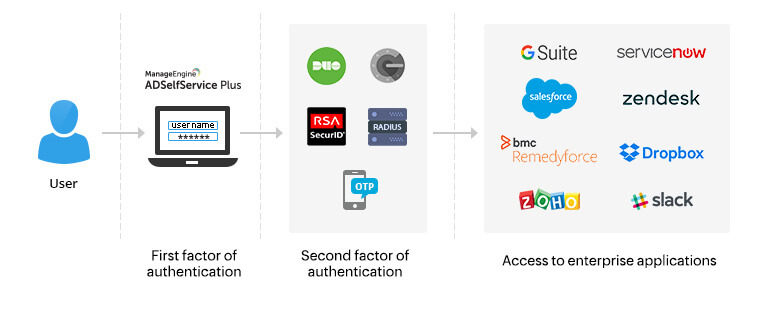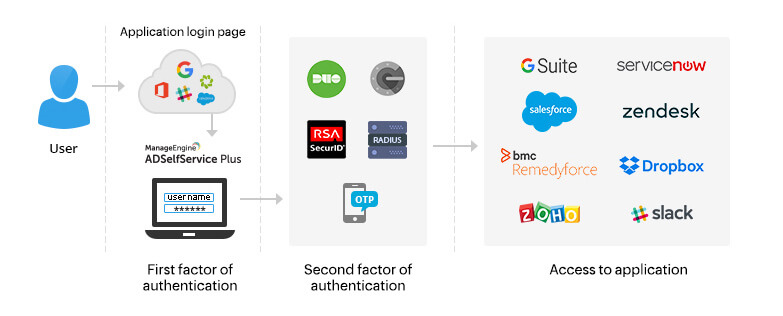The increasing number of enterprise applications in today's hybrid work environment is attracting unwanted attention from attackers trying to steal and misuse identities. Hackers can easily trick users into disclosing their credentials through phishing, keylogger, or manipulator-in-the-middle (MITM) attacks. And traditional authentication mechanisms involving just usernames and passwords cannot withstand these modern-day attacks.
To defend enterprise applications against these cyberattacks, organizations should deploy MFA techniques wherein additional factors aside from usernames and passwords are implemented to fortify end-user application logins. Besides MFA, enterprise applications can also be secured using strong and custom password policies. Click here to learn more about these policies.
ManageEngine ADSelfService Plus, an Active Directory MFA, SSO, and self-service password management solution, protects access to on-premises and cloud applications with strong MFA techniques such as phishing-resistant FIDO2 authentication and biometrics. On enabling SSO using ADSelfService Plus for enterprise applications such as Google Workspace and Salesforce, you can easily secure your organization's user identities.
When SSO is enabled, users must always authenticate themselves in ADSelfService Plus—first using their username and password and then through MFA authenticators chosen by you. Only then will users be able to access applications assigned to them. MFA for enterprise applications ensures that even when hackers compromise a user's credentials, they cannot gain access to the application and its data. ADSelfService Plus supports MFA for on-premises and cloud application logins initiated by both identity providers (IdPs) and service providers (SPs).


ADSelfService Plus supports the following authentication methods to secure enterprise applications:
Learn more about the MFA authenticators that ADSelfService Plus supports for on-premises and cloud application logins.
ADSelfService Plus uses the tried-and-tested Windows Active Directory domain credentials as the first factor of authentication. For the second factor, ADSelfService Plus supports strong factors such as biometrics, FIDO passkeys, smart card, Duo Security, RSA SecurID, RADIUS server, Google Authenticator, and verification codes sent via SMS or email.
Free Active Directory users from attending lengthy help desk calls by allowing them to self-service their password resets/ account unlock tasks. Hassle-free password change for Active Directory users with ADSelfService Plus ‘Change Password’ console.
Get seamless one-click access to 100+ cloud applications. With enterprise single sign-on, users can access all their cloud applications with their Active Directory credentials. Thanks to ADSelfService Plus!
Intimate Active Directory users of their impending password/account expiry by mailing them these password/account expiry notifications.
Synchronize Windows Active Directory user password/account changes across multiple systems, automatically, including Office 365, G Suite, IBM iSeries and more.
Ensure strong user passwords that resist various hacking threats with ADSelfService Plus by enforcing Active Directory users to adhere to compliant passwords via displaying password complexity requirements.
Portal that lets Active Directory users update their latest information and a quick search facility to scout for information about peers by using search keys, like contact number, of the personality being searched.